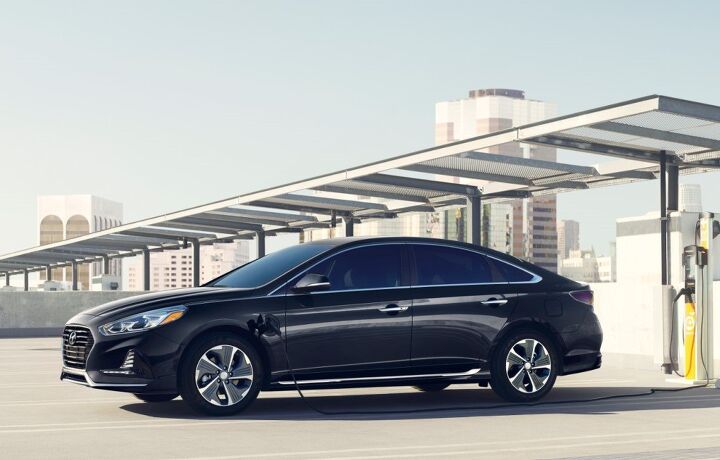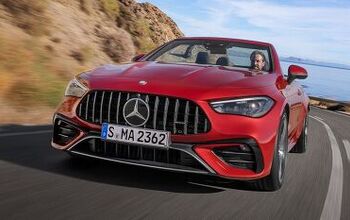Plug-in or Not, Hyundai Doesn't Want to Be Seen as the Expensive Choice

Exclusivity is not a word often associated with Hyundai, and with good reason. Like Nissan (but even more so), Hyundai’s reputation is built on a foundation of mass-produced vehicles with inherent value. And, even in the world of green cars, it seems that game plan can’t change.
So, it’s no surprise to see Hyundai take a hatchet to the price of its 2018 Sonata Plug-in Hybrid. In dropping the model’s entry price by $1,350 and adding one mile of electric driving range, Hyundai hopes it’s enough to attract the attention of would-be buyers. It needs to. In June, the model sat at 21st place on the public’s PHEV shopping list.
Starting now, a Sonata PHEV will set you back $33,350 before a $885 destination charge, while the Limited model grows $250 to $38,850 before destination.
For the base sticker, you’ll see the same 2.0-liter inline four and 50 kWh electric motor, the latter of which is good for 67 horsepower. The transmission remains a six-speed automatic. Hyundai now claims an EV driving range of 28 miles, up from the 27 advertised when the 2018 model debuted at the Chicago Auto Show. Any improvement is a good one, we suppose.
While cutting the entry price obviously adds value to the base model, the Limited’s slight price hike brings many new features aboard — LED headlights with “Dynamic Bending Light,” automatic emergency braking with pedestrian detection, a heated steering wheel, Driver Attention Alert, a wireless charging pad, and a USB port for rear seat passengers.
In a market awash with plug-ins, how has the Sonata fared? Not well, compared to other low-priced PHEVs. Granted, the 2018 model launched well after its Hybrid sibling, meaning that buyers could only source the old-style previous-generation model (even as the stock gasoline-only Sonata’s new design became old hat).
In June, Hyundai sold just 62 Sonata Plug-in Hybrids, a year-over-year drop of 29.5 percent. Over the first half of 2018, the model’s volume shrank by 28.9 percent. Even the plug-in version of the Kia Optima sells better. Year to date, Ford sold more than ten times as many Fusion Energi sedans.
The base Fusion Energi SE, which carries a range of 21 electric miles, stickers for $31,400 before destination — nearly two grand less than the new, cheaper Sonata PHEV.
[Images: Hyundai]

More by Steph Willems
Latest Car Reviews
Read moreLatest Product Reviews
Read moreRecent Comments
- Slavuta That car that they sell for $80K... Sell it for $50K
- NJRide I miss GM offering sedans.I don't miss a plasticky, uninspiring one not changed much from Obama's second term. As I have said before, the A-Bodies may have been an epoch but they had a certain charm to them. These have screamed rental class from Day 1 and have a third-world level engine.Sedans died because they got too cramped and too derivative. Especially the Big 3's offerings. The fact that there was no real move back to them when gas was $5 in 2022 shows this to be true. Then again the Trailblazer/Trax are hatches not SUVs. Non-identifying wagons and hatches along with on-road crossovers will be the "cars" of the upcoming era.
- Paul Alexander Having not seen any Cadi interiors, I must say I'm always surprised at how well all of their current offerings look when I see them on the road. Particularly the CT5 and Lyriq. Not sure it counts for much as I almost never see them.
- Zerofoo Some high school kid is going to love this car.
- Tane94 Model names from the past are not the answer. Cadillac is still recovering from the New York Joe deNysche error. What is Cadillac's identity? It walked away from its Standard of Excellence image long ago. Is it Electric Luxury? European Luxury built here? luxury performance? I don't know. Is all-electric models by 2030 still the goal?



































Comments
Join the conversation
I would gladly pay more for more horsepower. I imagine a bigger motor + battery would cover that price drop, add range, and give these kinds of cars decent acceleration without affecting gas mileage. I want a hybrid for my next car, but it's gotta run a 14 second quarter mile and burn regular gas. I honestly don't think such a car exists.
Unless gas prices go up more (and stay) up, most drivers (not in high gas price areas) won't see a return on a PHEV. Even a regular hybrid system take years to see a return; however, a 48V mild hybrid system would benefit the typical daily driver.